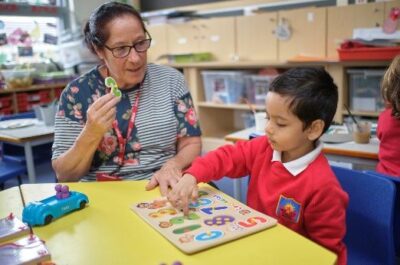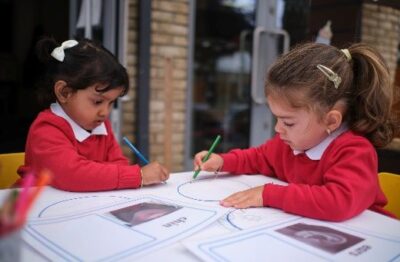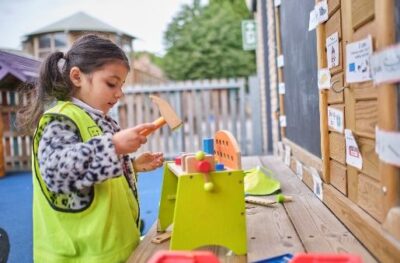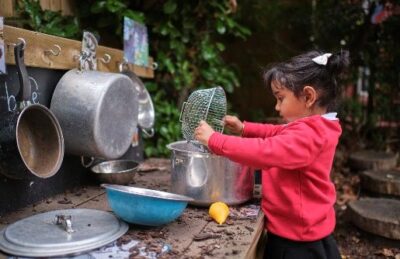At New City we aim to provide a happy, caring and stimulating environment where all children are encouraged to reach their full potential. Every child is at the heart of our curriculum, which has been built to ensure that no child is left behind.
We believe that children learn best through hands on experiences that are provided both indoors and outdoors. Children will develop positive attitudes towards learning as they are provided with a curriculum that meets their developmental needs.
We allow the children to make choices about the activities they want to participate in. At New City time is given each day to the direct teaching of reading, phonics, writing and mathematics. This ensures that our children are challenged and prepared for the Year 1 Curriculum and beyond.

As you walk around the Foundation Stage you will observe the children engaging in adult–led focused or child initiated learning activities.
We value the learning that has already happened in the home environment and aim to build on this by developing close relationships with parents and carers.
Together we are able to build on the child’s previous learning experiences and provide a personalised learning journey.
They need to:
- Use the skills we are teaching them in a calm and purposeful environment
- Immerse themselves in the processes
- Experiment and reinforce
- Explore
- Play
- Investigate
- Think Critically
- Challenge themselves
- Use high quality books that engage the children and spark excitement and enjoyment in learning about the world around them

During their time in Nursery and Reception, the children will experience and immerse themselves in a broad and balanced curriculum underpinned by effective pedagogy which covers the 7 areas of learning as stated in the Early Years Foundation Framework 2021.
The areas of learning are as follows:
Parents Guide to Early Reading with your child
At New City we aim to encourage a love of learning from an early age.
Why Sharing a book with your child is so important:
- It encourages good language and dialogue. Children learn new words and what they mean which builds up their vocabulary.
- It prepares children to become good readers, they learn that words carry meaning and begin to recognise words, letters and sounds.
- It helps them to listen and concentrate and it builds a longer and better attention span. Reading with your child also increases their memory skills which helps them in all areas of their learning.
- Reading to your child builds their imagination and their understanding of the world.
- Reading prepares children to become good writers as this increases their vocab and helps them create their own stories from their own imagination.
- Children begin to understand that stories have a beginning , middle and end.
- Reading with your child is a great opportunity for you to bond with your child as its quality time just focused on them.
- Helps to relax your child and addresses any feelings of anxiety around reading.
- This is a great opportunity to model handling a book correctly, turning the pages with care, reading from left to right and turning the book round the correct way.
Top Tips for reading with your child.
- Find a quiet and comfortable area to read, avoiding any distractions such as music, a tablet/phone or the television.
- Remember that reading with your child is not just for bedtime (often children are too tired to read). Reading can and should take place throughout the day when your child is willing to read.
- You can share a book anytime and any place, for example on a bus journey, in a waiting room.
- Allow your child to choose a book that they are interested in and allow them to turn the pages as this will keep them involved.
- Keep it short at first, they might only be able to listen for 5-10 minutes (then extend this time gradually when ready).
- Ask your children questions about the book, asking questions such as ‘What Happens next?’ helps with their understanding, as does asking them about the story after you have read it to check their understanding.
- Children love to read the same book over and over again. Although this can be boring for us adults it very helpful for the children as they learn the pattern of the words.
- Pointing to the words as you read them helps them learn that there is a difference between words and pictures and that words carry meaning. Using your finger as a guide also models reading from left to right.
- Rhyming books are great for young children as they quickly learn what words are coming next.
- Let children repeat the words after you as copying you makes them feel like they are reading and increases confidence.
- Keep it Fun, using a variety of different voices when reading aloud always helps!
- Children do not just have to read with mum and dad, why not involve the whole family, brothers, uncles, cousins, grandparents should all read alongside the children. The more people the children read with, the more confident they become.
- If you are not a confident reader yourself or English isn’t your first language it does not matter. Talking about the pictures in a book is just as important. Pointing at objects in books and saying the names (in your language) helps them associate words with pictures and learn the importance of language.
- Dual language books are now available in many book shops (see Newham Bookshop, Barking Roads).
Reading aloud to children helps create a lifetime interest in reading which is one of the biggest factors of success in school and further education.

EYFS Curriculum Map
Please click on the link below to view the curriculum map. It will open in a new window.

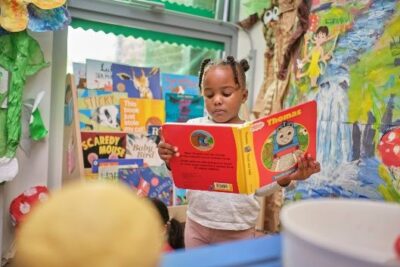
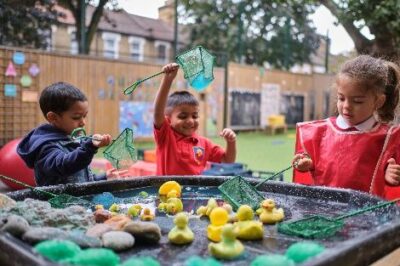
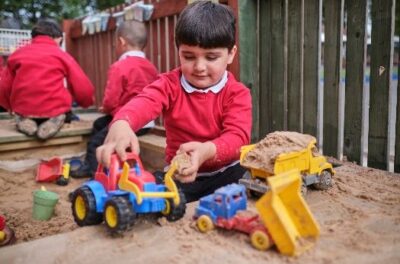 Children will learn a wide range of vocabulary through talking with the adults and their peers or singing nursery rhymes.
Children will learn a wide range of vocabulary through talking with the adults and their peers or singing nursery rhymes.